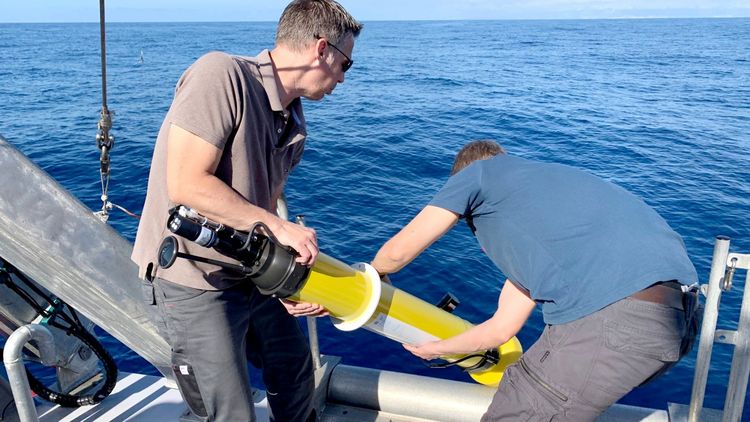Improved bio-optical measuring procedures of the Oldenburg University in a new BMBF project
A new pilot study within the scope of the German Federal Ministry of Education and Research (BMBF) funded project DArgo2025 aims at diving buoys with improved bio-optical measuring procedures. The ICBM research group Marine Sensor Systems at the University of Oldenburg, headed by marine physicist Prof. Dr. Oliver Zielinski is in charge of the partial study DArgo2025optics, which will end in late December 2021. It is one of a total of four pilot studies which will be conducted in cooperation with the GEOMAR Helmholtz Centre for Ocean Research Kiel, the IOW Leibnitz Institute for Baltic Sea Research Warnemünde as well as the BSH Federal Maritime and Hydrographic Agency in Hamburg, which is also coordinating the superordinate project. DArgo2025 is meant to elucidate scientific as well as technolgical questions of biogeochemical (BGC) Argo floats. Further developments of these measuring robots are going to form the future backbone of a global ocean observing system, covering the whole depth of the oceans.
It was shortly after the middle of the 19th century, when messages in a bottle became an important measuring device for marine scientists. While the basic principle remained, modern „bottle-messages“ are much more sophisticated. They are diving buoys, so-called Argo floats. Former messages in a bottle provided punctual information on ocean surface currents, whereas their modern counterparts additionally dive into the depth of the oceans on a regular schedule, recording depth profiles of several parameters, transmitting their data via satellite to science centres all over the world after resurfacing. At present, the current fleet of the international Argo programme consists of about 4,000 floats, originating from about thirty countries, and counting. Up to now, Germany has contributed about 160 of these high-tech gadgets.
While the original Argo floats just recorded pressure, conductivity and temperature, their up-to-date substitutes are capable to record biogeochemical data by employing optical measuring procedures. They measure, amongst others, dissolved oxygen, pH values as an indirect measure of carbonic acid, along with fluorescence of algae and dissolved organic matter. This will help create more complete ideas of climatological and ecological relevant global cycles, such as those of oxygen, nitrogen and biomass. In this context, accuracy, reliability and perdurability of the implemented bio-optical sensors are of major significance, particularly under the challenging conditions in the oceans, such as wind, wave effect, fouling, corrosion, and high pressure in the depth.
More (at present German only)



![[Translate to English:]](/f/5/_processed_/3/2/csm_ICBM-Logo-transparent-_91fe1c6774.png)
